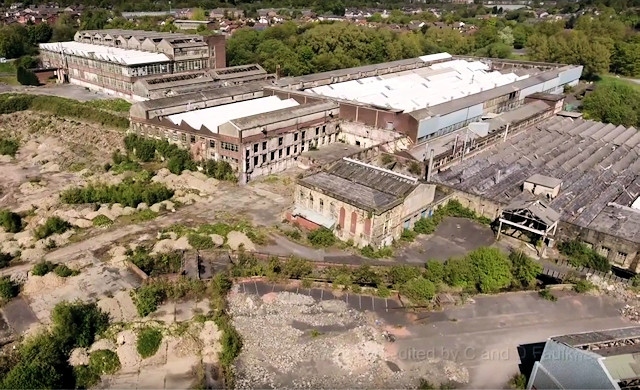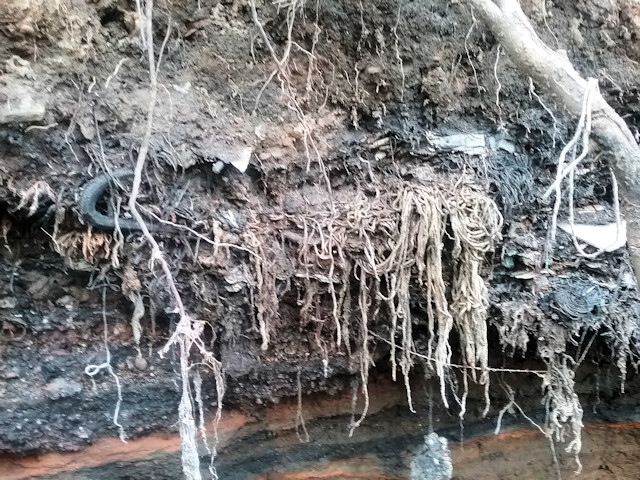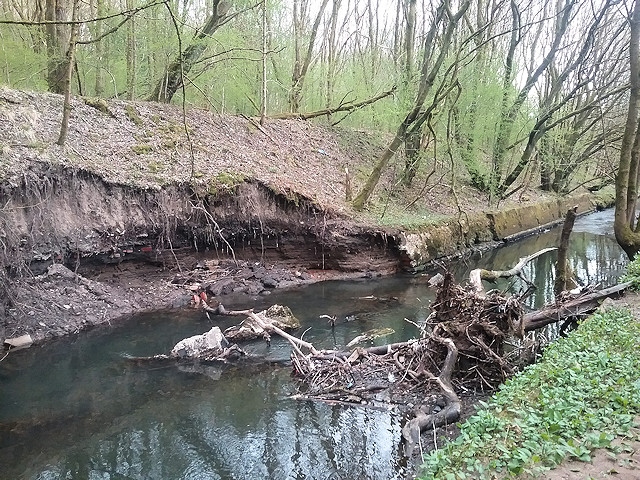Residents concerned 'asbestos could become airborne' following wet summer
Date published: 03 October 2019

Photo: Carl Faulkner
The former Turner Brothers Asbestos factory in Spodden Valley
Local residents are concerned that suspected asbestos near the former Turner Brothers Asbestos factory could become airborne after this summer’s wet weather.
Several residents have told Rochdale Online, that following this summer’s heavy rain, banks of the River Spodden, a tributary of the rivers Irwell and Mersey, near the former factory have eroded, appearing to expose asbestos.
Residents had previously complained about the condition of the banking over six months ago - known to be the boundary of a large tip used by the TBA factory from the 1920s until the early 1970s.
Their worries span from finding what is believed to be asbestos in the river and how far it may travel to the possibility of it becoming airborne after dry weather and concerns of children playing in the water.
One resident, Mick Coats, said: “With the recent heavy rain, the banks of the river have been eroded and appear to be exposing asbestos. This has been reported, but I have not received a response. Wet weather will dampen asbestos, but any period of dry weather risks making the asbestos airborne.”
Another resident, Kate Lawrence, added: “I reported the embankment a very long time ago. It’s been noticeably deteriorating for years, but this escalated after flooding.


“We have had quite a lot of high rain in recent months, which makes that river run very fast. I can only imagine how far that asbestos has travelled; I’ve been finding pieces all around the site and in the Spodden. It’s disgusting that no attempt has been made to sort it, and I feel like the public have not been a priority.
“The public, especially children, just don’t have a clue it is private land, or that it was the world’s largest asbestos factory.”

Their concerns have also been echoed by Hilda Palmer, of the Greater Manchester Hazards Centre and Save Spodden Valley campaigner, Jason Addy, who have been working to secure a safe future for the site.
In a joint statement, Ms Palmer and Mr Addy said: “GMHC and Spodden Valley campaigners first raised concerns about asbestos dump waste and the river over 15 years ago. The facts are clear: the hillside to the north of the TBA site was used as a dump for asbestos factory waste from at least the 1920’s until the early 1970’s.


“A section of the river Spodden was straightened (canalised) with a concrete bank-side retaining wall in the 1930’s. Turner & Newall commissioned several environmental reports in the 1980’s and 90’s recording these facts. This was confirmed via a Freedom of Information request in 2005 when Rochdale Council released the asbestos factory reports they held. The fact that tens of thousands of tonnes of asbestos factory waste was dumped on this site, and that the hillside beside the river may become unstable was confirmed in the Atkins Report commissioned by Rochdale Council in 2006.
“Concerns have been raised by local people for over 10 years about the precarious state of the asbestos dump hillsides regarding soil and riverbank erosion yet nothing was done. The predicted collapse of part of the concrete wall and banking was reported to Rochdale Council, over a year ago, in October 2018.

“This site was once the largest asbestos factory site of its type in the world. We repeat the fact that tens of thousands of tonnes of asbestos factory waste is known to have been dumped around the site, including this fragile hillside and embankment. It is foreseeable that significant asbestos fibres will be exposed in the soil and deposited into the River Spodden, a tributary of the River Roch, then Irwell, then Mersey that drains into the Irish Sea. It is foreseeable that bank side asbestos contaminated mud deposited downstream may dry and release respirable asbestos fibres to communities close to these rivers.
“Significant exposure to such fibres can cause irreversible lung disease and terminal, incurable cancers such as mesothelioma. The fibre sizes in question are measured on the nano scale - thousands of asbestos fibrils can fit on the tip of a needle.

“Concerns have been raised, respectfully, by local residents and campaign groups for over 15 years. The bankside collapse was predicted and was avoidable. The Spodden Valley TBA site must be treated with utmost respect and the people of Rochdale deserve answers.
“Why has there been such an unreasonable delay in addressing the increasingly urgent site hazards? Has there been a failure of enforcement and regulation by public bodies, who have clear statutory duties for our environment and public health, to use their legal power to protect us?
“Or are existing laws and enforcement completely inadequate to the task of protecting public and environmental health? After 15 years, we are entitled to know the answer.”


Nicola Rogers, head of public protection at Rochdale Borough Council, said: “The Environment Agency is the body responsible for the protection of the natural environment along water courses and they have confirmed the landowner is responsible for repairs to the riverbank.
“The landowner has arranged for civil engineering contractors to visit the site to scope out the work required to stabilise the riverbank.
“Although the council does not own the Turner Brothers site, we continue to try to find a long-term solution for it.”
A geophysical ground survey at the world’s former largest asbestos factory was carried out between November 2016 and March 2017 to determine ground quality and any presence of asbestos.
The results have still not been shared, despite both Rochdale Borough Council and MP Tony Lloyd contacting the landowners to request this information be shared.
The findings of the survey are still yet to be published.

The landowner’s representatives have previously confirmed they have received the survey report from their contractor: despite the representatives stating they intend to share the report with the council, the council has not yet been provided with the report nor a timeframe.
Founded in 1871 as Turner Brothers, the plant initially manufactured cotton cloth-based packaging. In 1879, the company became the first in the UK to weave asbestos cloth and fittingly changed their name to Turner Brothers Asbestos Company.
At the height of production, the works employed 2,000 workers and 2,000 administrators.
Do you have a story for us?
Let us know by emailing news@rochdaleonline.co.uk
All contact will be treated in confidence.
Most Viewed News Stories
To contact the Rochdale Online news desk, email news@rochdaleonline.co.uk or visit our news submission page.
To get the latest news on your desktop or mobile, follow Rochdale Online on Twitter and Facebook.


